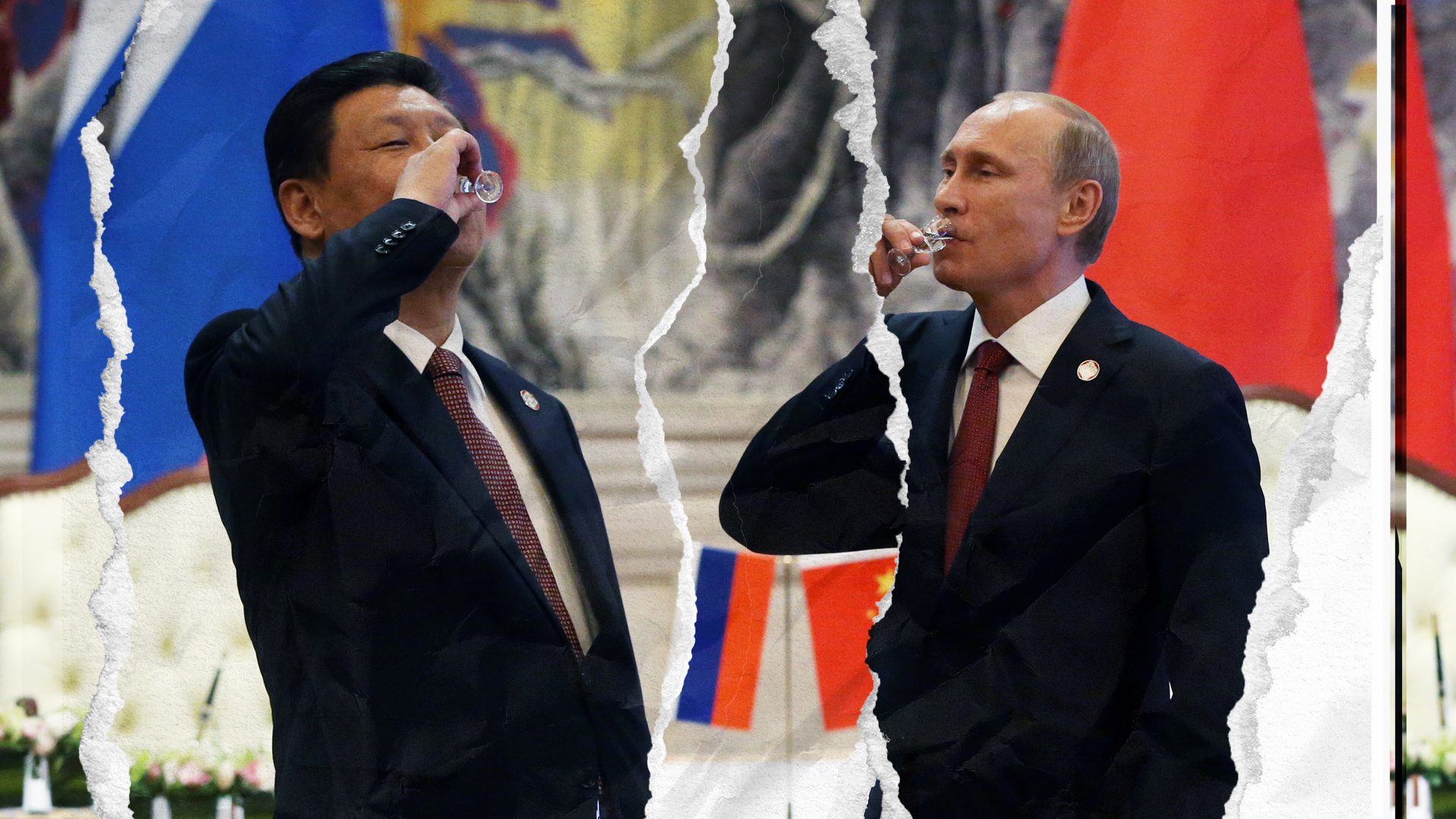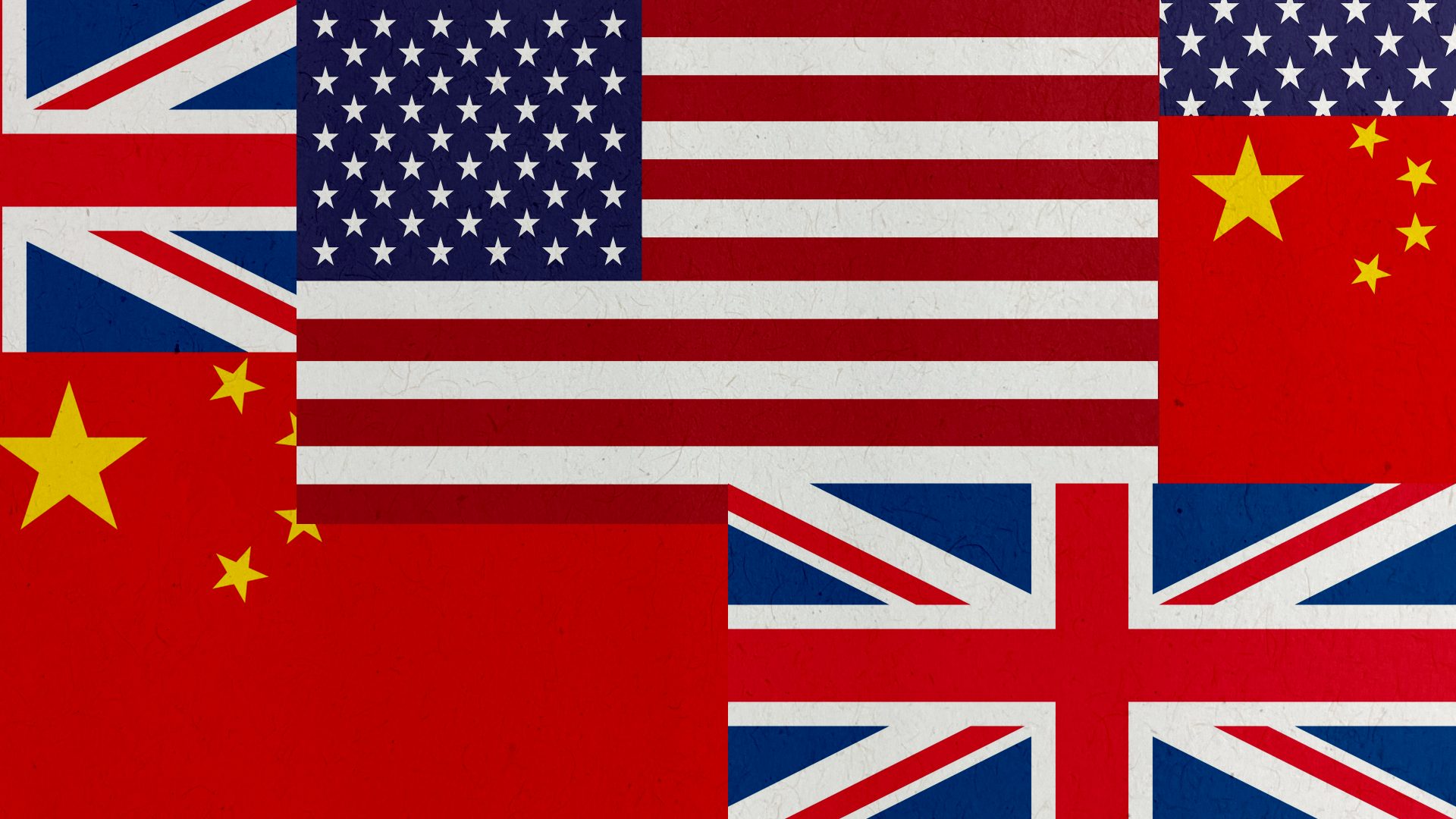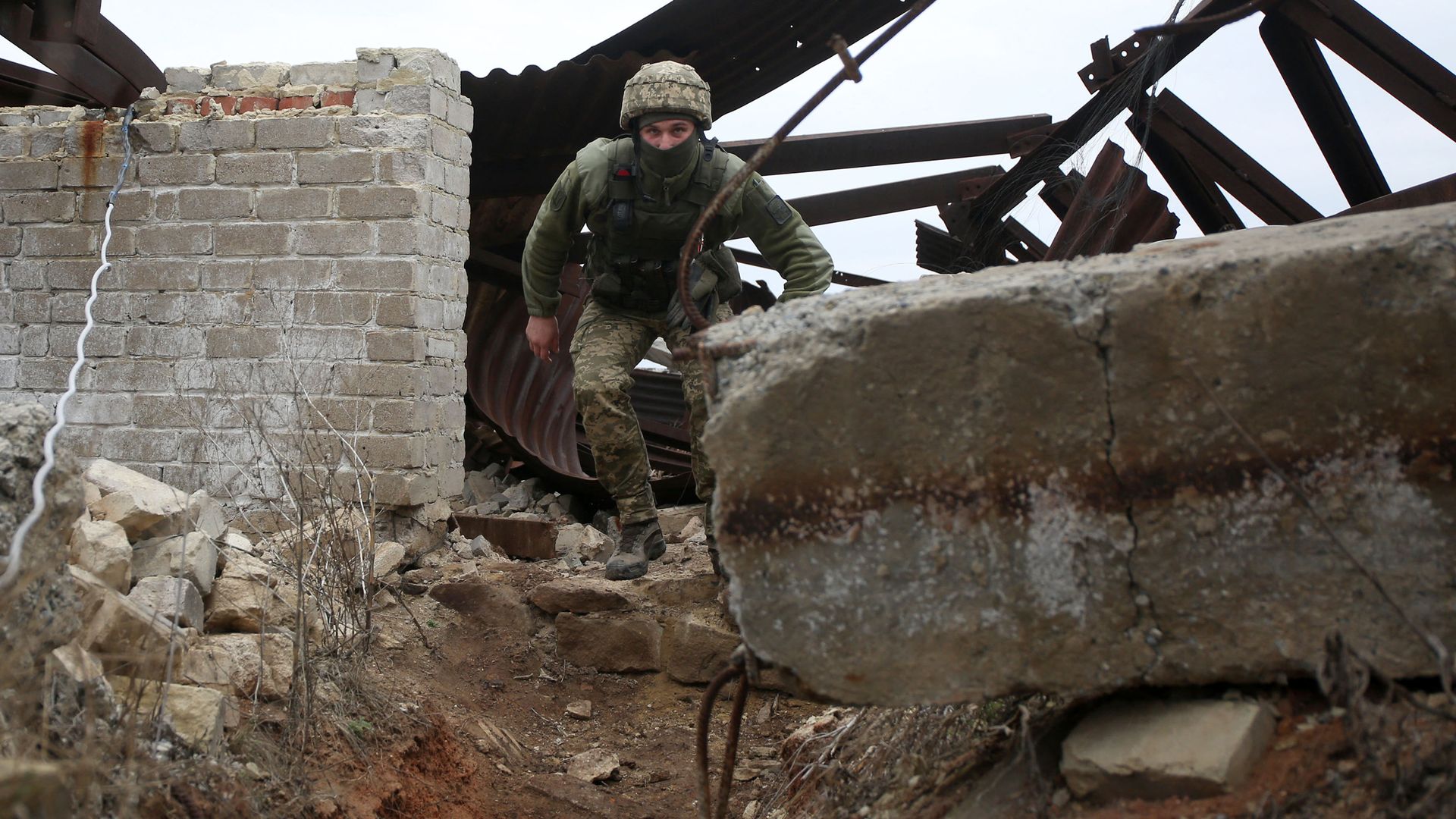The ceremony was choreographed, down to the fine detail: against a backdrop of flags, the two men wore identical suits, white shirts and matching purple ties as they declared their limitless friendship to the world. It seemed to lack only an exchange of rings. It was February 4, but feels like half a lifetime ago.
Vladimir Putin, the man Xi Jinping has called his best friend, was an honoured guest in Beijing, the only head of state to attend China’s Winter Olympics. The 5,000-word statement the two men released that day announced a deepening of a relationship that had not been this close since Joseph Stalin played elder brother to a resentful Mao Zedong.
The intervening years had not been smooth: the Sino-Soviet split in 1961, armed clashes on the Ussuri River in 1969; long years of mutual denunciations and accusations of revisionism, then China’s tilt to the US 50 years ago as Nixon and Mao sought each other out as a counterweight to Russia. Finally, the collapse of the Soviet empire, an event that so shocked the Chinese Communist party that it has spent the subsequent decades ensuring that no such catastrophe could overtake China.
Xi and Putin lead nations that have radically shifted in relative weight. China has long left its status as poor relation behind; its economic muscle has bought it global clout, and all of Russia’s former satellites now trade more with China than with Moscow. But as China squares up to the US in what it sees as a pivotal moment, Russia still has its uses.
Both Xi and Putin are convinced that power is shifting definitively away from a weary US and a weakened and divided Europe – a view that Xi has aired many times. As the joint statement put it: “A trend has emerged towards redistribution of power in the world, and the international community is showing a growing demand for leadership aiming at peaceful and gradual development.”
No prizes for guessing whom they judge history has chosen to supply that leadership. After all, who better than a country that has “longstanding tradition of democracy, which rely on thousand years [sic] of experience of development, broad popular support and consideration of the needs and interests of citizens”? As both men preach the superiority of their respective approaches to democracy to the world, Russia can provide security cover for China and China’s economy can help to sustain Russia as, together, they carve out new spheres of influence in a multipolar world.
Read in the light of what was to come, the statement is a truly Orwellian text: it contains the predictable preoccupations – Taiwan, “colour revolutions” and terrorism, which both parties condemn. Less obvious is the claim that both “respect the democratic systems and traditions of other states”; and “respect the rights of peoples to independently determine the development paths of their countries and the sovereignty and the security and development interests of states”. Ukrainians might be surprised to learn that they also jointly call on the international community to “respect the rights of peoples of different countries to self-determination”, or that they assert that “no state can or should ensure its own security at the expense of the security of other states”.
The question that history may eventually answer, but which for now remains open to speculation, is this: on February 4, 2022, was Xi Jinping being a fool or a knave? Did Putin deceive him about his intentions over Ukraine, or was he fully briefed and complicit in the subsequent slaughter? As Russia’s assault on Ukraine grows longer and more costly, the China question becomes more acute.
For several weeks before that February embrace, the US was in contact with the Chinese government, sharing intelligence on Russian military preparations and appealing to China to intervene. The Chinese government, reportedly, dismissed the US evidence, and shared it at least once with Moscow.
Chinese foreign policy experts, media pundits and, on occasion, foreign ministry representatives publicly mocked the talk of war and accused the US of irresponsibly ratcheting up tensions. Days before the Russian onslaught began, China’s foreign minister, Wang Yi, had agreed in Munich that Ukraine was no exception to the rule that territorial sovereignty was inviolable.
Once the war they said could not happen began, the chorus pivoted to a condemnation of the US. Beijing faithfully repeated Moscow’s talking points – that it was all the fault of Nato for failing to respect Russia’s legitimate security concerns.
If Putin had told Xi Jinping that, just as the US had warned, he did plan to attack Ukraine, how did Xi Jinping respond? If Xi tried and failed to dissuade him, might he now regret chaining China’s reputation to that of Russia’s increasingly brutal dictator? Alternatively, did he think this would be a short sharp military excursion, quickly over and with the upside for China of testing western responses?
To those questions, we might add one more: did Xi or his advisers make the mistake of believing their own propaganda about a simultaneously ill-intentioned and terminally declining West?
The evidence is mixed: the statements from Beijing have been runic to the point of being nonsensical. The situation was “complicated”, a spokesperson intoned, with the air of pronouncing a profound truth.
US intelligence sources insist that Xi Jinping’s only request was that Putin delay his war until after the Winter Olympics. A Chinese official has described this as a vicious slander, but Russia was confident enough to withdraw troops from the Chinese border to concentrate his forces on Ukraine. That could hardly have gone unnoticed in Beijing.
If Beijing was fully informed, however, it is striking that no provision was made for the safety of 6,000 Chinese citizens in Ukraine. Two days after the war began, as alarm began to grow among the ex-pat Chinese, China’s ambassador offered some advice: if they had to go out, he said, they should display a Chinese flag on their cars. The ambassador’s advice was soon derailed by reports of comments posted on Chinese social media that exulted in the war, and, in a particularly repellent vein, shared lewd jokes about Ukrainian women who might be obliged to flee into the arms of Chinese men.
Misinformation and war jokes blossomed, as China’s ultranationalists celebrated what they saw as the precursor of an armed assault on Taiwan. For several days, the comments were allowed to flourish, while anti-war comments were swiftly scrubbed.
As news of the Chinese social media reaction reached Ukraine, stranded Chinese citizens pointed out that this vulgar triumphalism was putting them at risk.
One student begged her fellow citizens on social media to tone it down: “Because of your thoughtless banter, international Chinese students might be denied refuge in bomb shelters,” she wrote. “We now have to conceal our Chinese identity.”
Days after issuing his confident instructions, the ambassador reversed his position: drop the flag, said the new advice and, if possible, don’t go out at all. It took five days for the embassy to organise buses to evacuate a few hundred stranded citizens.
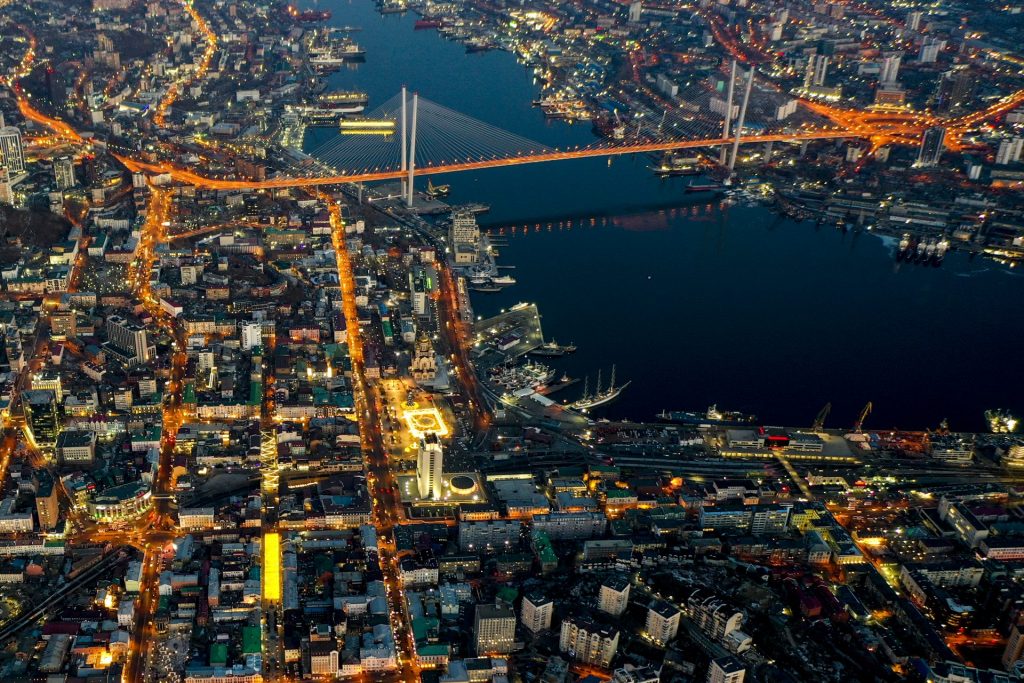
When China’s tech companies belatedly moved to clean up, they took down hundreds of video clips and comments, and suspended thousands of accounts.
On Weibo alone, China’s version of WhatsApp, more than 10,000 accounts were suspended and more than 4,000 mocking posts about the war were deleted.
China’s ultra-nationalists found scapegoats for this distasteful outpouring of triumphalism: a tiny handful of posts, they argued, had been exploited and amplified by “terrorists” in Xinjiang and Taiwan to damage China’s international reputation.
Five Chinese professors wrote a public letter denouncing the invasion, but their words were swiftly censored. Most of the “experts” wrongfooted by events doubled down on their contention that it was all the fault of the US and Nato.
The only Chinese foreign policy “expert” who had publicly predicted that Russia would invade Ukraine – a professor at FuDan University in Shanghai – reached that conclusion by a process of reasoning so bizarre it led him to pronounce, confidently, that Russia had launched its war because the US wanted it to and had laid a cunning trap that had successfully entangled Russia, Ukraine and the rest of Europe.
In 1979, when he visited the US, Deng Xiaoping told President Carter that he intended to “punish” Vietnam. To keep the USSR, Vietnam’s ally, from coming to Vietnam’s aid, Deng made it clear to Moscow that he was prepared for a full-scale war against the Soviet Union if necessary.
The invasion of Vietnam, which China termed a “self-defensive counter attack”, did not go entirely to plan: Chinese conscripts met their match in battle-hardened Vietnamese.
Deng, however, did not intend to stay: the expedition was a demonstration of power and, after invading in January 1979, Chinese forces withdrew the following month.
Did Xi Jinping imagine that Putin’s military adventure would be conducted along similar lines? A brief episode, with limited damage and perhaps a bit part for China to play as peacekeeper? If so, he grossly misread his best friend’s intentions.
China’s banks and companies have much at stake in Ukraine. China and Ukraine enjoyed $19bn (£14.5bn) in bilateral trade last year; Chinese engineers were building Kyiv’s metro; Chinese companies had renovated Black Sea ports and energy terminals; Ukraine is a key hub for China’s Belt and Road Initiative and the Xinjiang Production Brigade has a massive agricultural project using Ukrainian farmland to produce food for China.
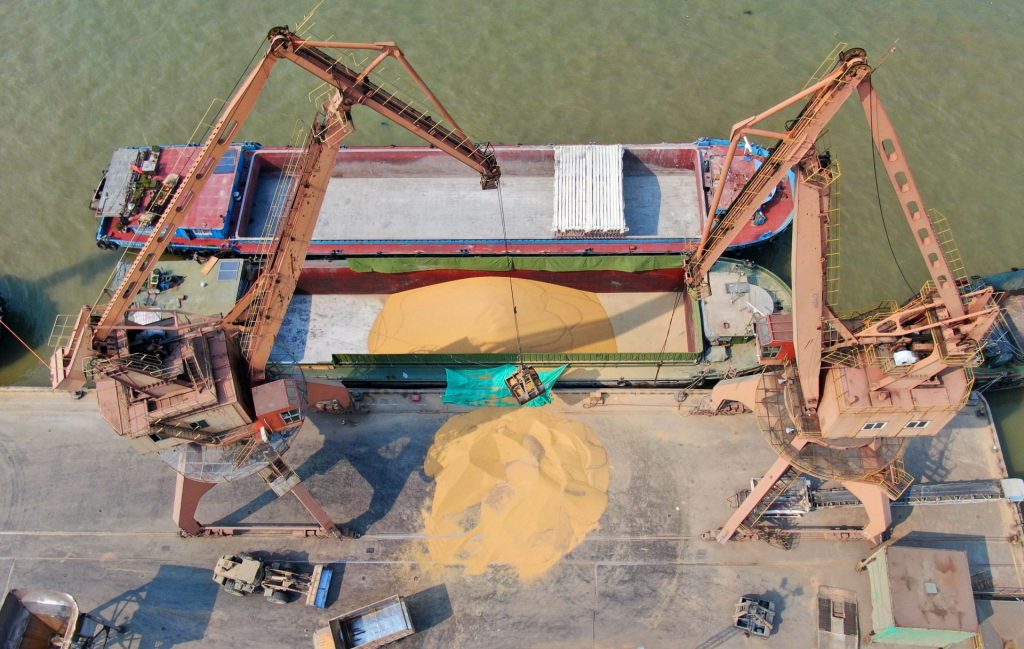
Given what is at risk, what might Xi have calculated he would gain? First, drawing the attention of the US away from Asia would ease pressure on China. And for obvious reasons, China had an interest in gauging the reaction of western democracies to a military adventure. Although China insists it aims for a peaceful “reunification” with Taiwan, it reserves the right to use force.
Ukraine could serve as a test case of how ineffective the West had become, confirming that the EU was too weak and greedy to stand up to Russian or Chinese pressure. Some lessons could be learned.
But as Ukraine descends into chaos, and Ukrainian resistance offers an inspiring picture of heroism, even the most obtuse Chinese analysts may come to suspect that the Russian plan is unravelling.
Too much chaos is not in the Chinese interest: a global economic downturn has negative implications for an economy already performing below par, and the sight of ordinary citizens heroically taking up arms to defend their homeland against overwhelming odds is not the lesson Beijing had hoped to learn for Taiwan.
Nor is the outbreak of unity and determination on display in Europe, where neutral Switzerland has joined the sanctions, Sweden has expressed interest in Nato, and Germany has finally come out for defence.
China’s equivocations have deepened European suspicions. China’s ambition to drive a wedge between the US and the EU has been dealt a serious blow.
And although western attention may be concentrated on Ukraine, there is horror in Asia, too: Singapore, a totemic friend of China, has condemned the war in Ukraine, and Japan has called on the US to clarify that it would, if required, defend Taiwan.
China has criticised the sanctions against Russia while failing to criticise Russian aggression. The word “invasion” is as absent from Chinese state media as from Russia’s, and Chinese media faithfully endorsed Russia’s claims that the US was developing bioweapons in laboratories in Ukraine.
Now China must decide how far it will go to protect Russia from the impact of sanctions: part of Russia’s sovereign wealth is denominated in renminbi, and the two countries can conduct limited trade in their own currencies without recourse to the dollar.
There are signs of caution, however: the Russian news agency Interfax has reported that China refused a request for aircraft parts, and Chinese banks are reportedly being cautious in their dealings with Russian counterparts.
If China were to respond to a Russian request for military assistance – a request China has so far denied – it would take China’s complicity to new and dangerous levels, locking it into a confrontation with the West that would poison economic and political relations for the foreseeable future.
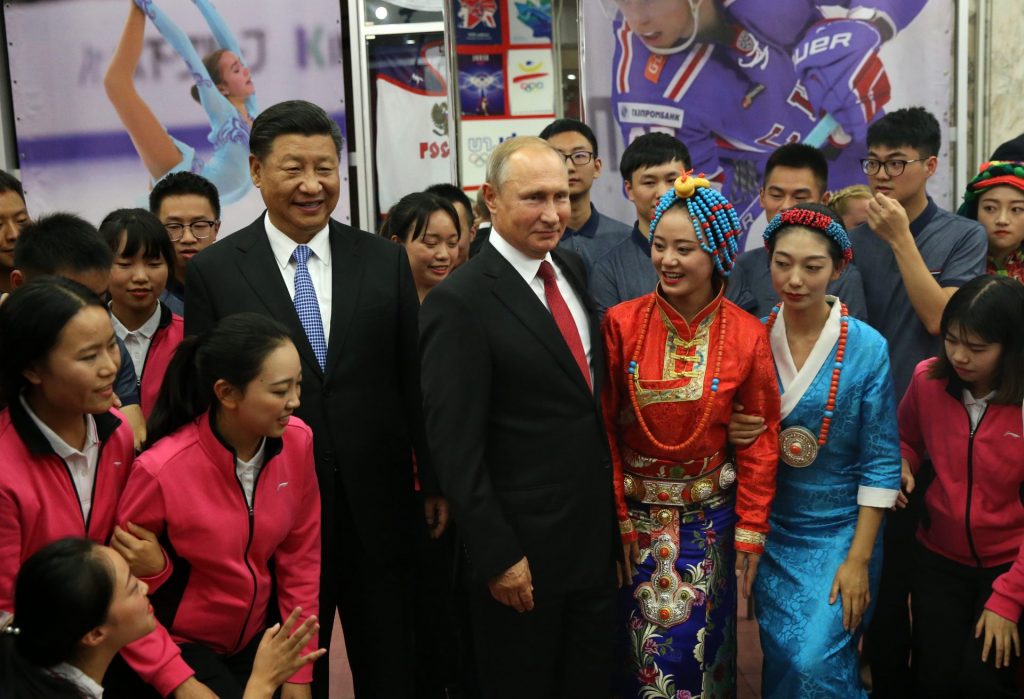
There is another potential loss: China has put at risk its reputation as a self-proclaimed responsible and peaceful power, an image it has cultivated ever since Hu Jintao coined the short-lived slogan “peaceful rise” in the mid-90s.
However loudly Beijing’s propagandists proclaim that black is white, for China to claim the role of peacemaker, having enabled the war, would be a morally repellent position. To claim it having misjudged Putin’s intent looks simply inept.
Xi Jinping is embarked on a big political year – one that he plans to complete with a renewed coronation at the 20th Party Congress in the autumn. How Ukraine – and Russia – look by then will affect how that bromance with which the year began is judged – and with it, the global reputation of China and its leader.
Isabel Hilton is a journalist, broadcaster, and founder of China Dialogue

